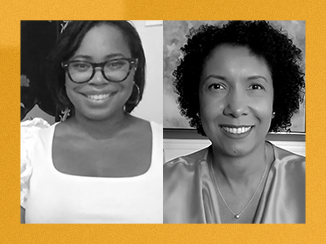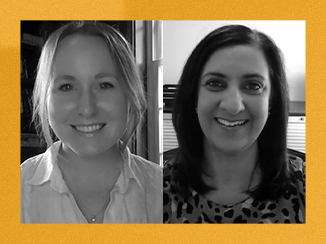Rewrite Your Money Story to Grow Your Business | Tory Burch Foundation
Operate my business
Rewrite Your Money Story to Grow Your Business
Understanding the relationship between your personal and business finances.
Link copied to clipboard
Business finances and personal finances may have different purposes, tax implications and liability profiles, but for small business owners, one thing they have in common is the person behind money.
That’s why financial self-awareness is key to financial empowerment, says author and financial literacy expert Natalie Torres-Haddad. The Financially Savvy Latina founder has helped clients change their money story for more than a decade, and joined our webinar series to share tips on building confidence about making financial decisions, using debt as a tool to help your business and more.
WHAT’S YOUR MONEY STORY?
Whether you pack a lunch or pay extra to add guacamole, everyone makes dozens of money decisions every day. Each of those decisions are informed by deeply ingrained beliefs and attitudes people have about money.
“Money is probably one of the strongest relationships we have that we don’t even know we have,” said Torres-Haddad.
These subconscious narratives—or money stories–are often shaped by our upbringing and personal experiences. They influence the way we think about earning, spending, saving, borrowing and investing. For example, if you believe that money is scarce and difficult to come by, you might adopt frugal habits and avoid taking financial risks. Conversely, if you believe that money is abundant and easy to get, you might be more inclined to spend freely and take on debt.
“Look at your personal [finances] because a lot of those habits, unfortunately, also transfer to our business,” she said.
By examining your money story, you can identify limiting beliefs or negative patterns that may be holding you back financially.
TURN CHALLENGES INTO GOOD MONEY HABITS.
Torres-Haddad shared some of the most common money missteps she sees among her clients and how she helps them change.
From commingling assets to smart self-funding
The first mistake new business owners usually make is mixing their personal money with business money, said Torres-Haddad. Not having clear lines between business and personal income can put your personal assets like your house or retirement funds at risk if your business gets into legal or financial trouble. It also makes bookkeeping and filing taxes a logistical nightmare. But self-funding, or using money from personal sources like savings or non-business credit cards for operating costs, is a primary source of financing for many women entrepreneurs since women have historically had less access to other financing options. In 2022, 25 percent of women business owners had their loan applications denied compared to 19 percent of male applicants, and 74 percent of women-owned firms relied on funds from personal savings, friends, or family for business operations compared to 64 percent of male-owned businesses, according to federal data.
If you decide to self-fund your business, Torres-Haddad suggests starting small and only investing what you can afford to lose. “I don’t ever want someone to leverage everything that they have,” she said. “Protect your family and protect your legacy.”
From overspending to strategic investments
Everyone knows it costs money to make money, but there’s a fine line between investing in your business and plain overspending. One way to spot the difference is to have a formal plan and set boundaries, Torres-Haddad said. When facing any business spending decision, entrepreneurs should ask themselves if the transaction is in line with their values and business plan, and be comfortable turning down opportunities that don’t fit.
“I want you to start learning how to say no,” she said. Rejecting things that don’t serve you frees up time and energy for the things that will. “You’ll feel less resentful, you’ll feel less stressed out, and you’ll feel a lot more confident in your decisions.”
Another mistake Torres-Haddad often sees is business owners using tax deductions as an excuse to spend more than they would otherwise. “Tax write offs are very helpful, but understand that it’s not something that will help you sustain [your business],” she said. “It doesn’t mean it’s free money forever.”
From debt avoidance to debt readiness
Many entrepreneurs pride themselves on not carrying debt, but borrowing can be a healthy part of any business’ financial picture, Torres-Haddad says. However, business loans and lines of credit can be convenient ways to finance expansion or smooth out cash flow during slow periods. It’s best to apply for business loans or lines of credit when you don’t need the money. If you apply for a loan when you’re starting to run out of cash, you’re less likely to be approved, as you may have already seen a dip in your credit score. In emergency situations, businesses without an existing line of credit often have to turn to expensive financing options like merchant cash advances. In 2022, women business owners were twice as likely as men to apply for merchant cash advances, which can be more than 3 times more expensive than a regular business loan.
“Get it when you don’t need it,” she said.
WRITE A NEW CHAPTER.
Once you’ve become aware of your financial beliefs you can start to challenge them and ultimately change your behavior. Remember that your money story was developed over your entire life so far; it is nearly impossible to change it one day. The best way to start rewriting your money story is to take small steps, Torres-Haddad said.
“As your business grows, you grow and you become a little bit more knowledgeable when it comes to your finances,” she said.
She suggests dedicating 10 minutes a day or at least one hour a week to reviewing all of your recent transactions, checking account balances and making arrangements for any upcoming bills. It may be easy to delegate monetary tasks to a bookkeeper or an app, but staying in constant contact with your money in this way helps you feel more in control and gives you the information you need to make better decisions.
“That one hour that you set for yourself is going to change the way you feel about your business,” Torres-Haddad said.
Since people who start businesses aren’t necessarily passionate about accounting, it’s natural that these kinds of financial check-ins sound like another chore on the list of seemingly endless administrative tasks that keep business owners from the work they love most. Torres-Haddad tries to make her own financial check-ins less tedious by turning them into a ritual. She makes herself a cup of tea, lights a candle, puts her phone away and gets to work.
“Make it an environment that you’d want to come to be present for,” she said.


